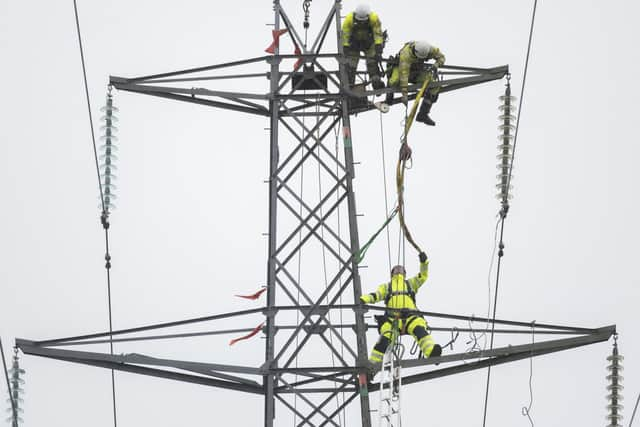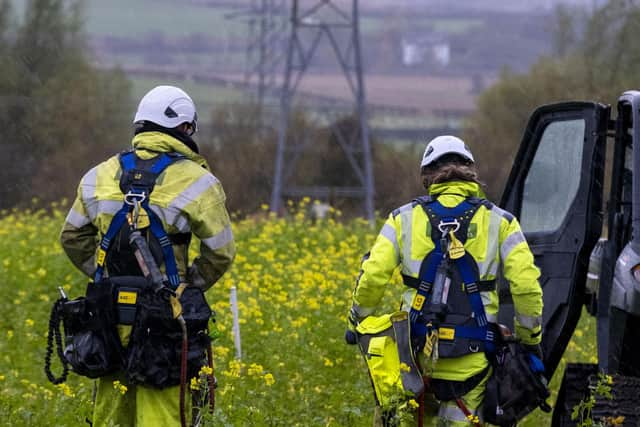AI: How Artificial Intelligence is being harnessed to reduce power cuts in Scotland as storm season takes hold
The £5 million Predict4Resilience project will use AI technology to identify where faults could occur as much as seven days in advance.
The warnings will allow the network operator to send out engineers and equipment to fix any problems as quickly as possible, reducing the length of time power supplies could be cut off.
Advertisement
Hide AdAdvertisement
Hide AdBy using AI, historical weather and fault data along with network asset and landscape information are used to develop machine learning models.
Combined with real-time weather forecasting, Predict4Resilience will be able to pinpoint locations where extreme weather will hit hardest and what damage can be expected much more accurately than ever before.
This will enable the Scottish Power Energy Networks (SPEN) control room to mobilise teams ahead of time, ready to restore power should a fault occur.
It’s hoped the innovative AI technology, which is still being tested out, will improve the network provider’s storm response and enable more efficient targeting of resources ahead of wild weather.


More than 37,000 homes in Scotland lost power due to the recent Storm Babet, which brought gale-force winds and deadly flooding to much of the country in October.
This prolonged severe condition posed considerable challenges for power companies, with over 450 network faults needing mended.
SPEN is one of two network providers in Scotland, responsible for the central and southern regions.
Scottish and Southern Electricity Networks (SSEN) is the other, operating in the north of the country.


Both companies also cover regions south of the border.
Advertisement
Hide AdAdvertisement
Hide AdIf the trials are successful, the system could be rolled out across the whole of the UK.
“Ahead of a severe weather event we mobilise hundreds of engineers, vehicles and generators alongside thousands of pieces of other materials, so we are ready to restore power as quickly and as safely as possible,” said Guy Jefferson, chief operating officer at SPEN.
“We know the disruption severe weather can bring to our customers and we are constantly investing in our network and investigating new technologies that could be used to keep this disruption to a minimum.
“Projects like Predict4Resilience offer us another tool to help inform our decision-making during a storm and help to reduce the time it takes us to restore power, minimising the impact of severe weather on our customers and communities even further.
“Through collaboration with Scottish and Southern Electricity Networks Distribution to expand our testing area, the trial phase of this project will provide us with robust learnings to meet our ambition of rolling this technology out across the UK.”
SPEN is working with partners to roll out the technology across the UK.
These include the University of Glasgow, where academics are developing the AI methods that underpin the new forecasting capability; SSEN Distribution, which will use the findings to test a different regulatory area, resulting in a wider scale area being tested; and Sia Partners, a global consultancy which can build the software and supporting infrastructure and provide business expertise.
Dr Jethro Browell, senior lecturer in statistics at the University of Glasgow, said: “We are excited to be working with a great team of partners to make our electricity networks more resilient in the face of climate change.
Advertisement
Hide AdAdvertisement
Hide Ad“This is a fantastic example of how the mathematical sciences can impact our everyday lives for the better.”
The project secured £4.5million funding from the Strategic Innovation Fund from energy regulator Ofgem and UK Research and Innovation (UKRI), which supports ambitious and innovative projects to accelerate the transition to net zero emissions.
Sebastien Gerber, head of data science and AI, UK and Ireland, at Sia Partners, added: “We’re proud to play such an integral role in Predict4Resilience and help create a more resilient network that minimises disruption and stress for customers, particularly for the vulnerable.
“We anticipate Predict4Resilience will bring about a range of significant financial, social and environmental benefits to the networks and their customers.”
Comments
Want to join the conversation? Please or to comment on this article.